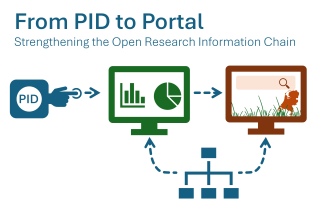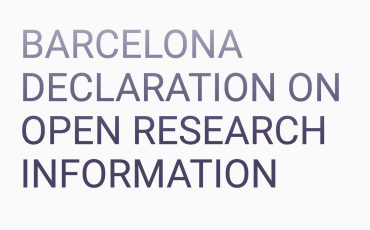
Why this project matters
Reliable and open research information is the foundation for Open Science. Yet gaps in metadata quality, PID adoption, and system integration still limit both institutional insight and national visibility. The PID to Portal project addresses these issues by connecting improvements in metadata monitoring with a sustainable governance model for the Netherlands Research Portal (NRP) — ensuring that institutions remain in control of their own research information.
This project directly supports the ORI program’s mission to build a federated, community-governed ecosystem of open research information that upholds academic values such as autonomy, integrity and openness.
Two goals
The project has two closely connected goals.
- Improved Monitoring of Open Research Information
The project will develop a framework for monitoring the quality, coverage, and reusability of Dutch open research information in multiple sources (CRISes, OpenAlex, OpenAIRE, etc). This includes measuring how PIDs (for researchers, outputs, projects, etc.) are used, how metadata are licensed, and how complete institutional datasets are. The outcome will be a prototype monitoring dashboard, shared metrics, and community workshops to design interventions for improvement. - Strengthening the Netherlands Research Portal Governance
In collaboration with OpenAIRE, we are forming a national consortium to co-govern the portal. Technical improvements will also include Single Sign On SURFconext integration, making access and participation easier for institutions, and an expert-finder feature to make researchers more discoverable to peers, journalists, and policymakers.
These two lines of work — monitoring and portal governance — are almost a symbiosis. The ORI Monitor will not just visualise how complete, open, and connected our research information is; it will also help us in a later stage decide what to fix next, together. At the same time, the Netherlands Research Portal will serve as both a showcase and a proving ground for these improvements — enabling enriched metadata feedback to the Repositories and CRIS systems, and demonstrating how better metadata, stronger governance, and open infrastructure can enhance national visibility and interoperability.
In this way, the PID to Portal project acts as both a mirror and a motor of change: the mirror shows us where we stand, and the motor helps us move forward collectively as one national ORI community.
About the data sources behind each goal.
While both goals strengthen the same national open research information ecosystem, they work with different types of data sources.
Goal A (ORI Monitoring) draws on multiple open data sources — including OpenAIRE, OpenAlex, Crossref, Unpaywall, and institutional CRIS and repository systems — to gain a broader and more reliable picture of how visible, complete, and openly licensed Dutch research information is.
Using several independent sources helps verify data quality and reveal where improvements are needed. These improvements will also feed into OpenAIRE, helping to enhance the metadata that power the Netherlands Research Portal.
Goal B (Portal Governance), by contrast, focuses exclusively on OpenAIRE because the Netherlands Research Portal currently runs on OpenAIRE’s infrastructure and aggregation services.
That is why the collaboration and governance work in this goal specifically target the partnership with OpenAIRE and the establishment of a national consortium to manage and sustain that service together.
Who we serve
The PID to Portal project brings together two closely connected but distinct communities of practice within the Dutch open research information landscape. Each community plays a crucial role in one of the project’s two goals, and together they form the foundation for a coordinated national approach.
Goal A (ORI Monitoring) — Supporting the Dutch Barcelona Declaration Signatories
For the first goal, Improved Monitoring of Open Research Information, we work closely with the Dutch signatories of the Barcelona Declaration on Open Research Information — including universities, research funders, and national organisations such as UNL, NWO, ZonMW, VH, SIA, KB, and SURF.
This community plays an advisory and co-creative role in shaping the ORI monitoring framework, helping us identify use cases, define indicators, and co-design interventions that improve metadata quality and PID adoption across institutions. In doing so, they advance the shared commitments of the Barcelona Declaration: openness by default, use of open systems, long-term sustainability, and collaboration.
In this project, Ana Ranitovic (University of Groningen) serves as the representative and liaison for this community. Ana is also the co-chair of the Dutch Barcelona Declaration group, bringing together institutions that have signed the Declaration and facilitating their involvement in the project’s consultations and workshops.
👉 You can reach out to Ana via the Dutch Barcelona Declaration network or directly through the ORI community channels on SURF Communities to share ideas, needs, or feedback related to open research information monitoring.
Goal B (Portal Governance) — Strengthening the NL Research Portal Community: Dutch Repository and CRIS owners and OpenAIRE members
For the second goal, Improving the Netherlands Research Portal Governance, we collaborate with the Dutch organisations that contribute to and use the Netherlands Research Portal (NRP) — including universities, universities of applied sciences, university medical centres and research institutes — and those that are or soon will become members of OpenAIRE.
This community will co-develop the national consortium that will govern the portal, supported by SURF and OpenAIRE. Their involvement ensures that the Netherlands Research Portal becomes a collectively owned and community-driven infrastructure, offering federated access via SURFconext, improved research visibility, and stronger international alignment.
Within the project, Joeri Both (VU Amsterdam) acts as the community representative and connector for this group. As liaison with OpenAIRE and coordinator of the upcoming Netherlands Research Portal Consortium, Joeri facilitates engagement between Dutch data providers and the European OpenAIRE ecosystem.
👉 Institutions interested in joining or connecting to the Netherlands Research Portal can contact Joeri via the OpenAIRE-NL community network or through SURF’s ORI workspace for more information and coordination.
What the community will notice
- CRIS and repository managers will gain clear feedback on metadata completeness and PID coverage.
- Open Science officers and policy makers will be able to use the new indicators for open access and open science reporting.
- Librarians and research supporters will be invited to workshops and hackathons to co-create improvement interventions.
- Technical partners will test the new NRP access workflows through SURFconext.
Timeline
- Winter 2025: consultations and framework design
- Early 2026: prototype ORI dashboard and pilot SURFconext integration
- Spring 2026: workshops and hackathon on metadata improvement
- Summer 2026: signing of the NRP consortium agreement and service contract with OpenAIRE
Meet the team
The kick-off brought together a diverse team from across the Dutch research information landscape:
Project Team
- Maurice Vanderfeesten (SURF) – Project Lead
- Rutger de Jong (Leiden University) – Metadata Quality Advisor
- Till Bey (SURF) – Information Architect
- Bianca Kramer (Independent) – Metadata Analyst & Methodology Lead
- Claudia de Visser (SURF) – Community & Event Coordination
Project advisors
- Ana Ranitovic (University of Groningen) – Liaison to NL Barcelona Declaration group
- Joeri Both (VU Amsterdam) – OpenAIRE / NL Portal Consortium Representative
- Arjan Schalken (UKB/VU/SURF) – UKBsis scholarly information services Representative
Steering Board
- Darco Jansen (UNL) – Project Executive
- Ana Ranitovic (RUG, Chair NL Barcelona Group) – Senior User – ORI Monitor
- Joeri Both (VU) – Senior User – NL Research Portal
- Eileen Waegemaekers (SURF) – Senior Supplier
Together, they represent the wider ORI community: universities, research funders, national platforms, and SURF experts collaborating under one shared vision — that research information should remain a public good under public governance.



0 Praat mee